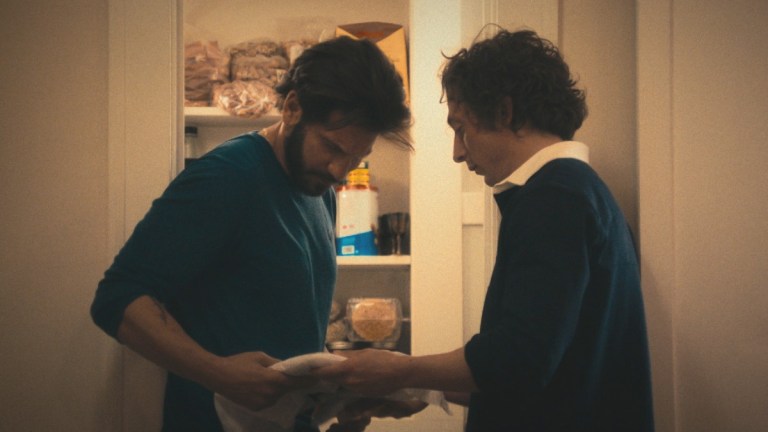Why The Bear’s Most Important Meal Is Feast of the Seven Fishes
The Bear season 2 episode 6 "Fishes" isn't just spectacular, it also captures the show's themes of cooperations vs. isolation.

This article contains spoilers for The Bear season 2.
In a show that joyously traffics in food porn, the Very Special Christmas episode of The Bear oddly features none. Throughout the season 2 flashback episode “Fishes,” the food imagery that exists is often utilitarian, swift, and violent. Meatballs angrily plop into a vat of roiling gravy, lobsters are audibly cracked in half, and a greasy artichoke unceremoniously falls to the floor. In an episode that underscores the indelible connections between emotion, tradition, trauma, and food, the choice to not linger on the dishes feels very intentional. As in much of The Bear, the focus on food is an emotional conduit, providing a platform for deeper conversation.
In the Berzatto household, the yearly celebration of the Feast of the Seven Fishes is a chaotic, often hellish tradition. The unstable matriarch Donna (Jamie Lee Curtis in a stellar go-for-broke performance) prepares the meal in a frenzy while chain smoking and binge drinking in the kitchen. The rest of the assorted guests — of both the biological family and found family variety — know that it’s just a matter of time before Donna decompensates entirely, but in the true tradition of dysfunctional families, they’re trapped in a cycle of learned helplessness, just lying in wait for the explosion. They know that no one can stop what’s coming, but bound by love, curiosity, and duty, they stick around anyway.
To pass the time, the group chats about the Feast of the Seven Fishes. What does it mean, exactly? One gets the sense that these people have had this conversation many times before — the three Berzatto kids don’t even bother engaging with the topic — but what else are they going to do while the ticking time bomb in the kitchen counts down? Donna asserts that the fishes represent the “seven best things” that the Italians brought with them to America. Then, Uncle Lee (Bob Odenkirk) mumbles some stuff about sacraments, virtues, and the biblical undertones of the number seven, which is a theory that only makes tangential sense. Later, when Stevie (John Mulaney) says grace under duress, he surmises that it represents taking time out to prepare seven carefully crafted dishes to “show them that we love them.” Everyone is wrong — the concept of the fishes actually represents the vigil, or the long wait for the baby Jesus, in addition to the fact that eating meat isn’t allowed until Christmas Day — but Stevie, in all his nebbish wisdom, gets the closest to why Italian-American families actually cook the fishes.
Honestly, even though I’m an Italian-American who spent the majority of her childhood Christmases eating the seven fishes, I had no idea what it actually represented, but Stevie’s interpretation rings true to me. Every year I’d watch a gaggle of aunties, cousins, and nanas flit around my Uncle Tony’s kitchen, lovingly preparing dish after dish, shouting for everyone to come “mangia e fatta grosso!” as each course was piping hot and ready. (In their collective wisdom, they rolled the courses out one by one instead of preparing a full sit-down dinner.)
Watching Donna’s anxiety-addled kitchen nightmare unfold, I was immediately struck by the fact that she was doing it all on her own. Accompanied only by an army of shrill timers, a never-ending glass of red wine, and a set of very questionable sanitation practices (dear god, that garlic bread), she’s determined to do it all by herself. People repeatedly offer help and she refuses it, berating them or screaming until they run out of her kitchen. Somehow, Carmy (Jeremy Allen White) is the only one allowed to remain in the kitchen, his passage assured by his ability to passively take abuse from his unstable mother.
Here, as we watch Carmy try to manage the Christmas chaos— in one infuriating moment, Donna screams at him for failing to move a pot even though she never told him to move it in the first place — we can see why he would excel in the high-pressure environment of a professional kitchen. We can also understand his overwhelming desire to streamline the system at the Beef throughout the first season. Looking back, it’s clear that Michael had implemented the Donna way of doing things, but having seen the rest of the world, Carmy knows better. Carmy loves food because he’s aware that thoughtfully preparing food is a way of expressing love, but he also knows that it’s impossible to excel in a wholly capricious and unpredictable environment.
What Donna doesn’t seem to realize, or perhaps she doesn’t want to realize, is that preparing the fishes isn’t just about love, it’s also about collaboration. In my memory, it took an army of relatives hustling and bustling in the kitchen throughout the evening to accomplish what Donna accomplished in a full day and night of cooking. But Donna just isn’t a natural collaborator; her untreated mental health disorder leads her to isolate, play the martyr, and lash out at anyone who might burst her bubble. Her (subconscious) aim is to create a volatile situation so that everyone else can feel just as off kilter as she feels. And she succeeds. When poor Pete (Chris Witaske) shows up with a tuna casserole (ew) to contribute to the festivities, everyone immediately bristles. Michelle (Sarah Paulson) drolly comments, “That’s the eighth fish, bro,” and Carmy frantically asks what’s under the foil, telling him that if there are eight fish, then they’ll be assholes. Eventually, Sugar (Abby Elliot) snatches the dish and throws it outside — the only influence allowed at this dinner is Donna’s.
Notably, this myopic approach to cooking is not how recipe creation, food preparation, and general hospitality works in the rest of The Bear. Elsewhere in season 2, the concepts of collaboration, caring, and service are celebrated and elevated. Both Sydney (Ayo Edibiri) and Marcus (Lionel Boyce) find communion in talking shop and learning from their peers in Chicago and Copenhagen. Tina (Liza Colón-Zayas) rejoices in finding her groove as a chef, and has a character breakthrough in a lovely karaoke moment with her fellow culinary students. Even the taciturn Richie (Ebon Moss-Bachrach) finds purpose when he learns to work as part of a team while staging at a Michelin-star restaurant. And, for all of his faults, Carmy utilizes the menu of his new restaurant as a conduit for healing and connection.
It’s no coincidence that a tribute to Donna’s Seven Fishes ends up on The Bear’s opening night menu alongside a play on Marcus’s perfect donut that Carmy once smashed to bits on the floor of the Beef. Carmy knows his family is dysfunctional — and he knows that the Berzatto dysfunction lives in him — but he’s doing his best to heal from old wounds. The collective efforts behind the donut, the Seven Fishes dish, and the savory cannoli — a.k.a. “The Michael” — all illustrate how he’s working to break the cycles of abuse that defined his childhood. He’s still making mistakes, but he’s working to make things right by sharing his space and time with others.
Unlike Donna’s nightmare-before-Christmas feast, all of the dishes at The Bear are lovingly caressed by the camera. We watch, entranced, as they’re assembled, discussed, and sampled with gusto by the team in the kitchen. Like all the dishes at the restaurant, the Seven Fishes are plated intentionally, with each fish taking up a small but distinct amount of space. The diners at The Bear will probably never learn Carmy Berzatto’s personal history with the fishes, but they will feel special and cared for in a way that just might feel like waking up on Christmas morning.
All 10 episodes of The Bear season 2 are available to stream on Hulu now in the U.S. The season will premiere July 19 on Disney+ in the U.K.
